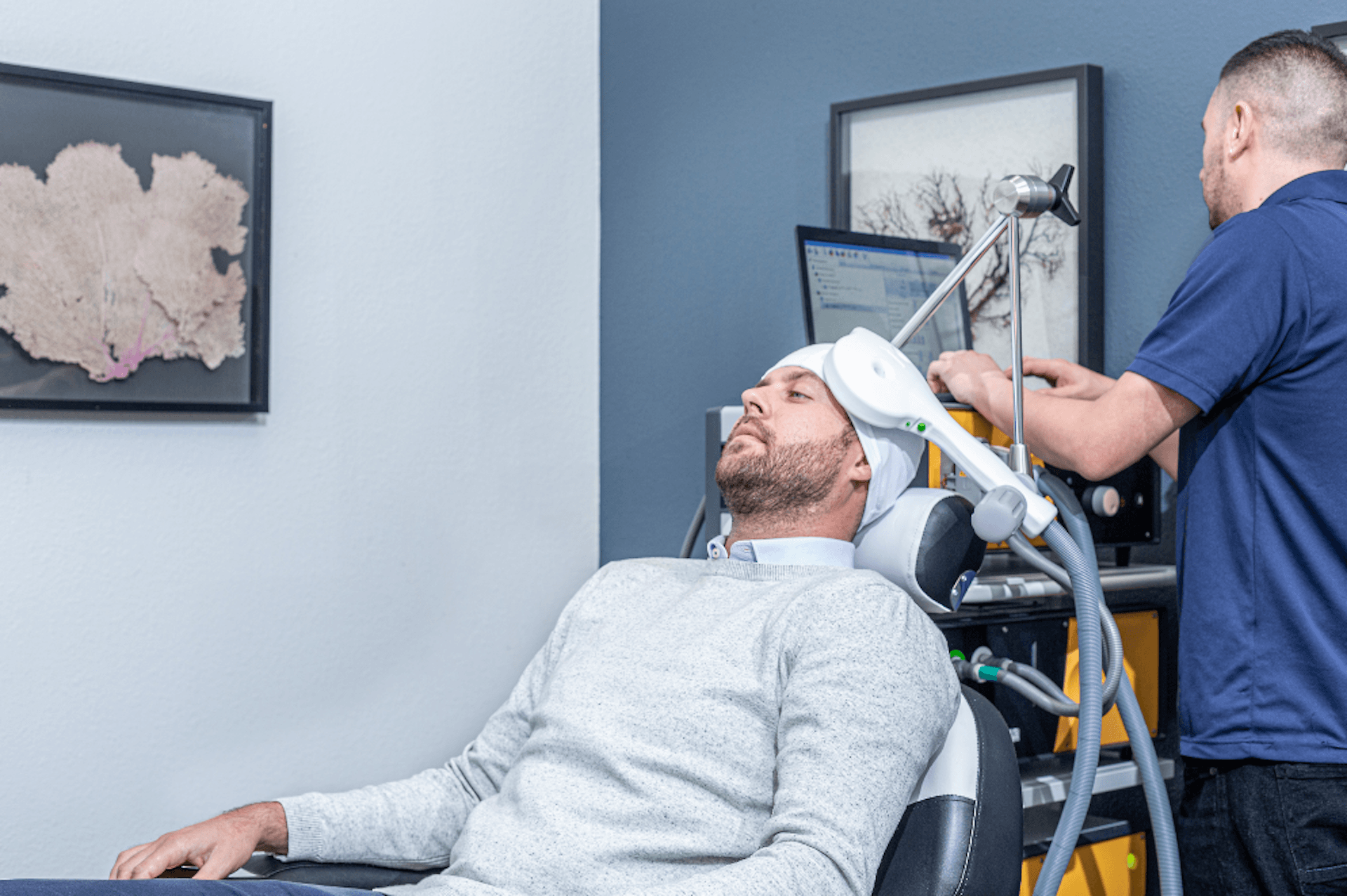Benefits of TMS Therapy


Discover the benefits of TMS therapy for depression and anxiety. Find the best TMS therapy near me for safe, drug-free, and effective mental health treatment.
Struggling with depression, anxiety, or addiction can feel overwhelming, especially when traditional treatments don’t bring relief. Transcranial magnetic stimulation (TMS) therapy offers a non-invasive, drug-free option that has helped many regain control of their mental health.
At The Forge Recovery Center, we are committed to providing innovative, personalized care—including TMS therapy—to support your journey to recovery. If you're searching for the best TMS therapy near you, understanding its benefits is essential. In this article, we will explore how TMS therapy works, its advantages, and how it fits into a comprehensive mental health and addiction recovery plan.
Understanding TMS Therapy

Transcranial magnetic stimulation (TMS) therapy is an advanced mental health treatment that harnesses electromagnetic energy to stimulate underactive regions of the brain linked to mood regulation. By delivering targeted magnetic pulses to these areas, TMS encourages healthier brain activity, helping to reduce symptoms of depression, anxiety, and even addiction-related cravings.
Unlike treatments that rely on medications to alter brain chemistry, TMS directly influences neural pathways, promoting natural healing and long-term symptom relief.
Over a series of sessions, this process helps retrain the brain, making it more responsive to positive stimuli and reducing patterns of negative thought and emotional distress.
FDA Approval and Medical Recognition
TMS therapy has been rigorously tested in clinical trials and earned FDA approval in 2008 for its effectiveness in treating major depressive disorder (MDD).
Since then, its applications have expanded, and it is now recognized as a safe and evidence-based therapy for obsessive-compulsive disorder (OCD) and other conditions.
Leading mental health organizations, including the American Psychiatric Association (APA) and the National Institute of Mental Health (NIMH), acknowledge TMS as an essential option for individuals who have not responded to traditional treatments. At The Forge Recovery Center, we integrate TMS therapy into our personalized care plans, helping individuals rediscover stability, clarity, and hope in their recovery journey.
Primary Benefits of TMS Therapy

For individuals struggling with depression and other mental health challenges, TMS therapy offers a proven, effective treatment without the need for medication or invasive procedures. Here’s how it can make a difference:
Effective Treatment for Depression
TMS therapy has been a breakthrough for individuals struggling with major depressive disorder (MDD)—especially those who have not found relief through medication or therapy alone. Research shows that 50-60% of patients with treatment-resistant depression experience significant symptom improvement with TMS, while about 30% achieve full remission.
By stimulating underactive regions of the brain linked to mood regulation, TMS helps rewire neural pathways, gradually reducing symptoms of depression, anxiety, and emotional numbness. Unlike medications, which affect the entire brain and body, TMS delivers targeted treatment, ensuring a more precise and effective approach to healing.
A Drug-Free Alternative to Traditional Treatments
Many individuals struggling with depression rely on antidepressants or mood stabilizers, which often come with unwanted side effects such as weight gain, fatigue, nausea, or sexual dysfunction. TMS therapy provides a completely drug-free approach, making it an attractive option for those who either cannot tolerate medication or prefer a more natural, science-backed alternative.
Moreover, while antidepressants require weeks or months to take full effect, many TMS patients begin noticing improvements within a few sessions. Because it works by stimulating the brain directly, TMS doesn’t cause systemic side effects, making it a gentler, yet highly effective treatment for long-term mental health recovery.
Minimal Side Effects
Unlike traditional depression treatments that can cause significant side effects, TMS is well-tolerated by most patients. The most commonly reported side effects include:
Mild scalp discomfort or headaches during or after treatment, which typically subside after a few sessions.
Temporary lightheadedness or tingling sensations, which are harmless and short-lived.
In rare cases, TMS may cause slight twitching in facial muscles during the session, but this stops once the treatment ends.
Unlike electroconvulsive therapy (ECT), TMS does not cause memory loss or cognitive impairment, making it a safer and more comfortable option for long-term mental health care.
Convenience and No Downtime
TMS therapy fits seamlessly into daily life. Each session lasts between 20 to 40 minutes, and there is no sedation, anesthesia, or recovery time required—patients can drive themselves home or return to work immediately after treatment.
A typical course of TMS involves five sessions per week for four to six weeks, with noticeable improvements often emerging within the first two weeks. Unlike other treatments that require lifestyle disruptions or strict medication schedules, TMS allows individuals to continue their daily activities while working toward better mental health.
At The Forge Recovery Center, we believe in making cutting-edge mental health treatments accessible and effective. TMS therapy is a key part of our personalized approach to healing, helping individuals regain control of their lives and build a future free from the weight of depression and anxiety.
Are You Struggling with Mental Health or Addiction?
We Can Help. Call Us Now!
CALL: 877-839-1772
TMS Therapy for Co-Occurring Disorders

Mental health and addiction often go hand in hand. Many individuals struggling with depression or anxiety also battle substance use disorders (SUDs), creating a cycle that can be difficult to break. TMS therapy is proving to be a valuable treatment option not only for depression but also for co-occurring conditions like anxiety disorders and addiction. By targeting dysfunctional brain activity, TMS helps restore balance, providing relief from symptoms that fuel both mental health struggles and substance dependency.
TMS for Anxiety Disorders
Anxiety disorders affect millions of people, often leading to excessive worry, panic attacks, and difficulty managing daily stress. TMS therapy has shown significant promise in reducing anxiety symptoms, particularly for individuals who haven’t responded well to therapy or medication.
By stimulating areas of the brain responsible for emotional regulation—such as the prefrontal cortex and amygdala—TMS helps reduce hyperactivity in anxiety-related brain circuits. This can lead to:
A decrease in excessive worrying and intrusive thoughts
Improved ability to handle stress and social interactions
Better emotional regulation, helping individuals feel calmer and more in control
For individuals experiencing generalized anxiety disorder (GAD), panic disorder, or PTSD, TMS offers a non-medication approach to relief, addressing the root cause of anxiety at the neurological level rather than just managing symptoms.
TMS for Substance Use Disorders (SUDs)
Addiction is not just a behavioral issue—it is a brain disorder that alters neural pathways linked to impulse control, cravings, and reward processing. Many individuals struggling with substance use disorders also experience underlying depression, anxiety, or trauma, making recovery even more challenging.
TMS therapy is emerging as a promising treatment for addiction by targeting brain areas linked to cravings and compulsive behavior, such as the dorsolateral prefrontal cortex (DLPFC). Research has shown that TMS can:
Reduce cravings for drugs and alcohol by modulating reward system activity
Improve impulse control, making it easier to resist urges to use
Enhance emotional stability, reducing the likelihood of relapse due to stress or depression
For individuals in early recovery, TMS can be particularly beneficial in preventing relapse by helping regulate mood, decrease withdrawal symptoms, and rewire unhealthy brain patterns associated with addiction.
At The Forge Recovery Center, we understand that mental health and addiction are deeply connected, which is why we offer TMS therapy as part of our comprehensive treatment plans. Whether you're struggling with anxiety, addiction, or both, TMS can be a powerful tool in your recovery journey—helping you regain control, reduce symptoms, and build a healthier future.
TMS Therapy and Neuroplasticity
The brain is not a fixed organ—it has the ability to change, adapt, and rewire itself based on experiences and treatments. This ability, known as neuroplasticity, plays a crucial role in mental health recovery. TMS therapy leverages neuroplasticity to strengthen and restore healthy brain function, helping individuals break free from the patterns of depression, anxiety, and addiction.
By delivering targeted magnetic pulses to areas of the brain associated with mood, decision-making, and impulse control, TMS stimulates the growth of new neural connections. This process:
Enhances cognitive function, improving focus, memory, and problem-solving skills
Reverses unhealthy brain activity, reducing symptoms of depression and anxiety
Promotes long-term emotional resilience, making it easier to manage stress and triggers
For individuals struggling with mental health conditions or substance use disorders, strengthening neuroplasticity through TMS can be a game-changer—helping them develop new, healthier ways of thinking, feeling, and coping.
Are You Struggling with Mental Health or Addiction?
We Can Help. Call Us Now!
CALL: 877-839-1772
Integration of TMS Therapy at The Forge Recovery Center
At The Forge Recovery Center, we believe in a personalized, science-backed approach to healing. Because no two recovery journeys are the same, we incorporate TMS therapy into customized treatment plans that address each individual’s unique needs.
Our expert team works closely with clients to determine whether TMS is the right fit for their recovery. We integrate it alongside other evidence-based treatments, including:
Cognitive Behavioral Therapy (CBT) to help reframe negative thought patterns
Medication-Assisted Treatment (MAT) for individuals in addiction recovery
Holistic approaches, such as mindfulness and lifestyle coaching
By combining TMS therapy with comprehensive mental health care, we ensure that individuals receive the best possible chance at long-term recovery. Whether you're battling depression, anxiety, or addiction, our goal is to provide the most effective, innovative treatments to help you reclaim your life.
Are You Struggling with Mental Health or Addiction?
We Can Help. Call Us Now!
CALL: 877-839-1772





